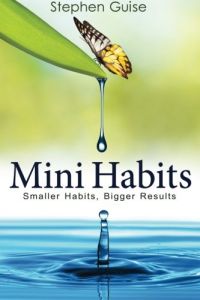Join getAbstract to access the summary!

Join getAbstract to access the summary!
Stephen Guise
Mini Habits
Smaller Habits, Bigger Results
CreateSpace, 2013
What's inside?
One small step for a man or woman equals one giant leap in your mini-habits improvement program.
Recommendation
Personal development blogger Stephen Guise offers a self-improvement program that promises to be “too small to fail.” A “mini habit” is a positive behavior that you perform in its smallest component until it becomes second nature. An exercise program becomes one push-up; a reading goal becomes one sentence. The willpower you need to succeed falls to zero. Guise guarantees that repetition and repeated success can turn any mini habit into a new lifelong pattern. His concept is beautiful in its simplicity. getAbstract recommends Guise’s advice to anyone who wants to make a positive change, even if you read just one sentence at a sitting.
Summary
About the Author
Stephen Guise, who started writing the Deep Existence blog in 2011, covers personal development strategies.






















Comment on this summary